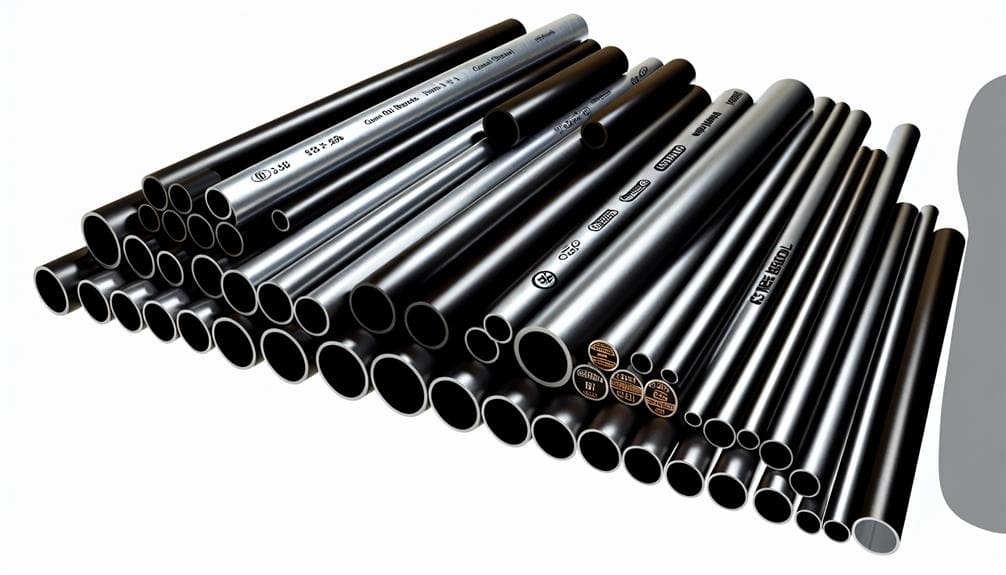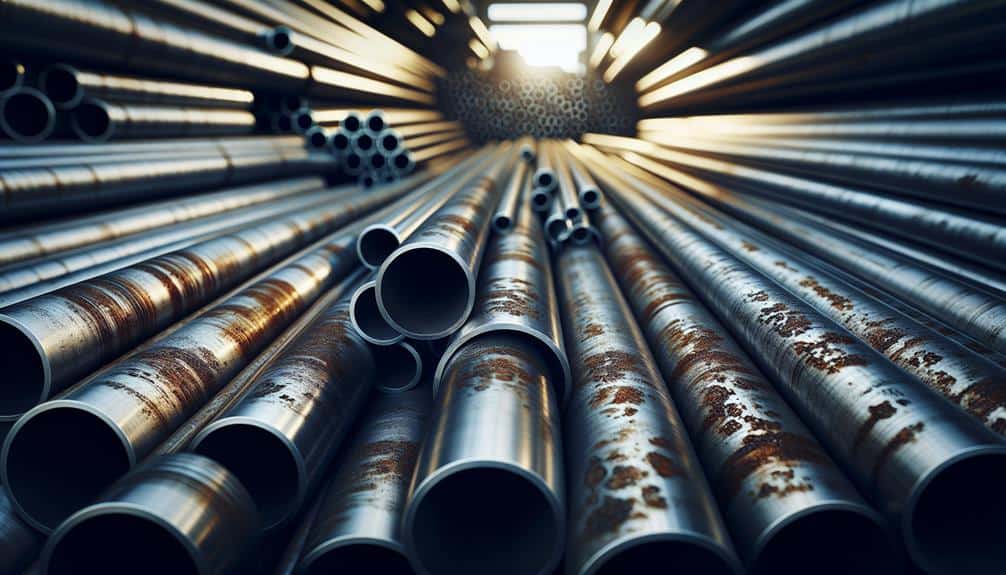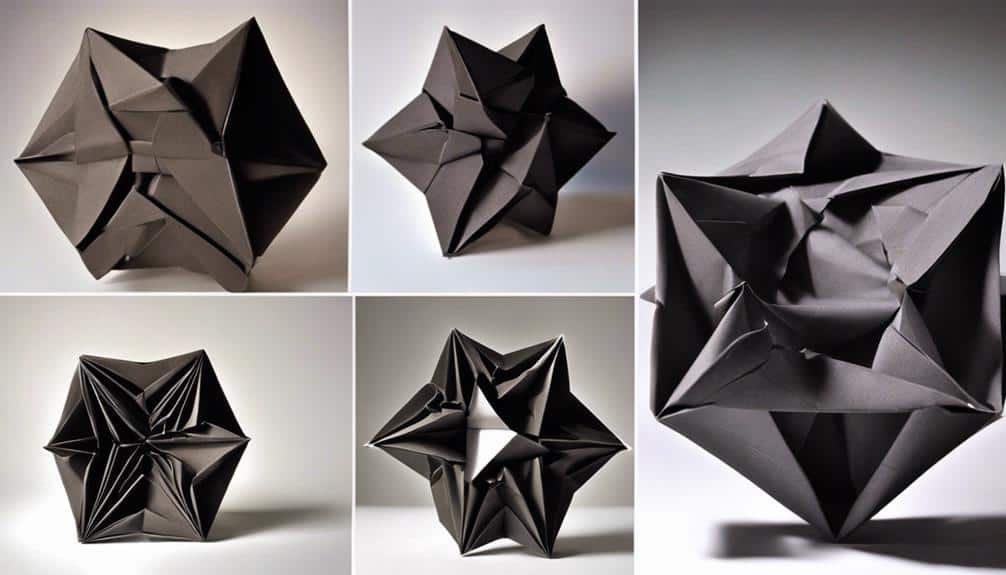Carbon steel round tubing is versatile with different grades for specific properties. Mechanical round tubing has higher tensile strength, tighter tolerances, and consistent wall thickness. Low carbon may need coatings for corrosion, while mechanical tubing is better for precision applications. Mechanical round tubing is common in construction, automotive, and manufacturing for its strength and durability. The manufacturing process differs with mechanical tubing having higher strength and durability but with higher production costs. In the construction industry, mechanical tubing is preferred for high structural strength projects. For a deeper insight into the distinctions and applications of these carbon steel tubing types, contact us.
Key Takeaways
- Mechanical tubing has tighter tolerances and consistent wall thickness for precision applications.
- Low carbon tubing is generally cheaper but may require additional coatings for corrosion resistance.
- Mechanical tubing offers higher tensile strength and durability compared to low carbon tubing.
- Mechanical tubing withstands heavier loads and stresses, ideal for structural applications.
- Low carbon tubing is versatile but mechanical tubing provides better value in precision applications.
Comparing Carbon Steel Round Tubes: Applications and Differences

When comparing carbon steel round tubes, it is important to understand their specific applications and the nuanced differences between them to make informed engineering decisions. Material properties play a significant role in determining the suitability of a carbon steel round tube for a particular application. Factors such as tensile strength, yield strength, and hardness can vary between different grades of carbon steel, impacting their performance under different conditions.
Corrosion resistance is another key aspect to take into account when selecting carbon steel round tubes. Some grades offer better resistance to corrosion than others, making them more appropriate for environments where exposure to moisture or chemicals is a concern. Strength comparison is essential for applications that require high load-bearing capacity. Different grades of carbon steel exhibit varying levels of strength, influencing their suitability for structural applications.
Welding capabilities and heat treatment effects are also important considerations. The welding characteristics of carbon steel round tubes can vary, affecting the ease of fabrication and the quality of the weld joints. Additionally, the response of carbon steel to heat treatment can impact its mechanical properties, making it necessary to choose the right grade for the desired hardness or ductility.
Low Carbon Round tubing vs Mechanical Low Carbon Round Tubing

When comparing low carbon round tubing with mechanical low carbon round tubing, it is imperative to discern the distinct characteristics that differentiate these two variants with respect to their structural properties and performance attributes.
Key Differences:
-
Strength Comparison: Low carbon round tubing is known for its lower tensile strength compared to mechanical low carbon round tubing, which is engineered to meet specific strength requirements.
-
Material Properties: Mechanical low carbon round tubing typically has tighter dimensional tolerances and more consistent wall thickness, offering enhanced precision in applications.
-
Corrosion Resistance: Low carbon round tubing may require additional coatings for improved corrosion resistance, unlike mechanical low carbon round tubing that is often designed with corrosion-resistant properties.
-
Cost Effectiveness: While low carbon round tubing is generally more cost-effective, mechanical low carbon round tubing provides better value in precision-demanding applications due to its superior properties.
Carbon Steel Mechanical Round Pipe Uses

Carbon steel mechanical round pipes find extensive use in various industries such as construction, automotive, and manufacturing. These pipes are commonly employed for structural applications, including in the construction of bridges, buildings, and machinery.
The high strength and durability of carbon steel make it an ideal material for demanding mechanical applications.
Application areas of carbon steel mechanical round tubing
In various industries, carbon steel mechanical round tubing finds extensive use due to its superior strength and durability properties. It is a versatile material that is utilized in various applications, including:
-
Automotive applications: Carbon steel mechanical round tubing is commonly used in the automotive industry for exhaust systems, roll cages, and chassis components.
-
Agricultural machinery: It is employed in the manufacturing of farm equipment such as tractor frames, plows, and harvesters.
-
Structural supports: The tubing serves as a reliable choice for constructing buildings, bridges, and other structural frameworks.
-
Material handling: In warehouses and manufacturing facilities, carbon steel mechanical round tubing is essential for creating conveyors, racks, and storage systems.
These diverse applications highlight the importance and versatility of carbon steel mechanical round tubing in various industrial sectors.
Manufacturing Process Comparison: Mechanical vs. Ordinary Carbon Steel Round Tubes

A comparative analysis of the manufacturing processes utilized in the production of mechanical and ordinary carbon steel round tubes reveals distinctive methodologies that significantly impact the final product’s properties and applications.
Concerning material properties, mechanical carbon steel tubes are known for their high strength and durability compared to ordinary round tubes. The strength comparison between the two types shows that mechanical tubes are designed to withstand heavier loads and stresses, making them suitable for applications requiring robust structural support.
Production efficiency is another key factor, with mechanical tubes typically being manufactured using more complex processes to achieve their specific properties, affecting production costs. This leads to cost differences between mechanical and ordinary round tubes, where mechanical tubes tend to be pricier due to the additional manufacturing steps involved.
Additionally, the surface finish characteristics of mechanical tubes are often smoother and more uniform, enhancing their aesthetic appeal and corrosion resistance compared to ordinary carbon steel round tubes.
Comparison of applications in the construction industry

The distinct material properties and manufacturing processes of mechanical and ordinary carbon steel round tubes directly influence their respective applications within the construction industry.
-
Structural Strength: Mechanical carbon steel tubing is often preferred in construction projects requiring high structural strength due to its enhanced mechanical properties and tight dimensional tolerances.
-
Design Flexibility: Ordinary carbon steel round tubes are commonly used when design flexibility is a priority, allowing for easier customization and adaptation to various construction requirements.
-
Corrosion Resistance: Mechanical carbon steel tubing, with its protective coatings and surface finishes, is favored in construction applications where corrosion resistance is essential for long-term durability.
-
Cost Efficiency: Ordinary carbon steel round tubes are a cost-effective option for many construction projects, offering a balance between performance and affordability.
In the construction industry, the choice between mechanical and ordinary carbon steel tubing boils down to factors such as structural requirements, design constraints, environmental conditions, budget considerations, and the need for long-lasting durability.
To learn more, please contact us
For further inquiries or detailed information regarding carbon steel tubing options and applications, please do not hesitate to reach out to our knowledgeable team.
When delving into the world of carbon steel tubing, understanding the material properties is essential. Carbon steel offers excellent strength and durability, making it ideal for various industrial applications such as construction, automotive, and manufacturing.
One significant consideration when choosing carbon steel tubing is its corrosion resistance. Depending on the environment in which the tubing will be used, different grades of carbon steel may be more appropriate to guarantee longevity and performance. Additionally, heat treatment plays an important role in enhancing the mechanical properties of carbon steel tubing, further improving its strength and toughness.
Welding techniques are also crucial to think about when working with carbon steel tubing, as proper welding practices can ensure structural integrity and longevity. Our team can provide guidance on selecting the right carbon steel tubing based on your specific requirements and offer expertise on material properties, industrial applications, corrosion resistance, heat treatment, and welding techniques.
Contact us today to learn more and optimize your carbon steel tubing choices.
Frequently Asked Questions
What Are the Specific Advantages of Using Mechanical Low Carbon Round Tubing Over Low Carbon Round Tubing in Certain Applications?
In specific applications, mechanical low carbon round tubing offers superior strength, impact resistance, and weldability compared to low carbon round tubing.
This tubing variant excels with regards to corrosion resistance, flexibility, and machinability, making it a cost-efficient and versatile option.
Its high yield and toughness further enhance its performance in demanding scenarios.
These attributes collectively position mechanical low carbon round tubing as a reliable choice for applications requiring robustness and adaptability.
How Does the Manufacturing Process Differ Between Mechanical Carbon Steel Round Tubes and Ordinary Carbon Steel Round Tubes?
The manufacturing processes for mechanical carbon steel round tubes and ordinary carbon steel round tubes vary greatly. Differences exist in welding techniques, specifications, and applications, affecting corrosion resistance, surface finish, and strength properties.
Heat treatment, forming methods, and material composition play essential roles. Additionally, machining capabilities, tolerance requirements, and cost considerations differ between the two, influencing their respective advantages and limitations in various industrial applications.
Are There Any Notable Disadvantages or Limitations to Using Carbon Steel Mechanical Round Pipes in Certain Construction Projects?
In construction projects, utilizing carbon steel mechanical round pipes may present limitations. These pipes, while durable and versatile, can be heavier than other materials, potentially affecting transportation and installation processes.
Additionally, their mechanical properties may not be suitable for all applications, leading to constraints in design flexibility. Understanding these drawbacks and evaluating project requirements thoroughly can help in determining the most appropriate materials for construction endeavors.
Can Carbon Steel Round Tubing Be Used in Applications Outside of the Construction Industry?
Carbon steel round tubing finds extensive use beyond the construction industry due to its versatility and strength. It is commonly employed in industrial applications, such as manufacturing equipment and structural components.
Additionally, automotive uses, agricultural machinery, marine applications, and the energy sector benefit from its durability. Custom fabrication for commercial projects and its adaptability to alternative industries further highlight the broad range of applications for carbon steel round tubing.
How Do the Differences in Applications Between Carbon Steel Round Tubes and Mechanical Carbon Steel Round Tubes Affect Their Overall Performance and Durability in Various Scenarios?
In evaluating the performance and durability of carbon steel round tubes versus mechanical carbon steel round tubes in various scenarios, factors like corrosion resistance, impact strength, heat treatment, weldability, and machinability play vital roles.
The differences in applications between these two types of tubing greatly impact their overall behavior under different conditions, leading to distinct outcomes in terms of performance and longevity.
Understanding these distinctions is essential for selecting the appropriate tubing for specific applications.
Conclusion
In summary, the distinctions between carbon steel round tubing and mechanical tubing are vital in various applications, particularly in the construction industry.
The manufacturing processes and structural differences play a significant role in determining the suitability of each type for specific uses.
Understanding these disparaties is essential for ensuring peak performance and durability in engineering projects.
The choice between round and mechanical tubing can make a monumental difference in project outcomes.


